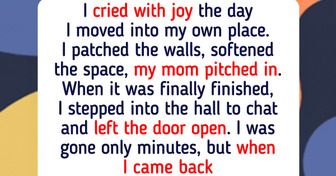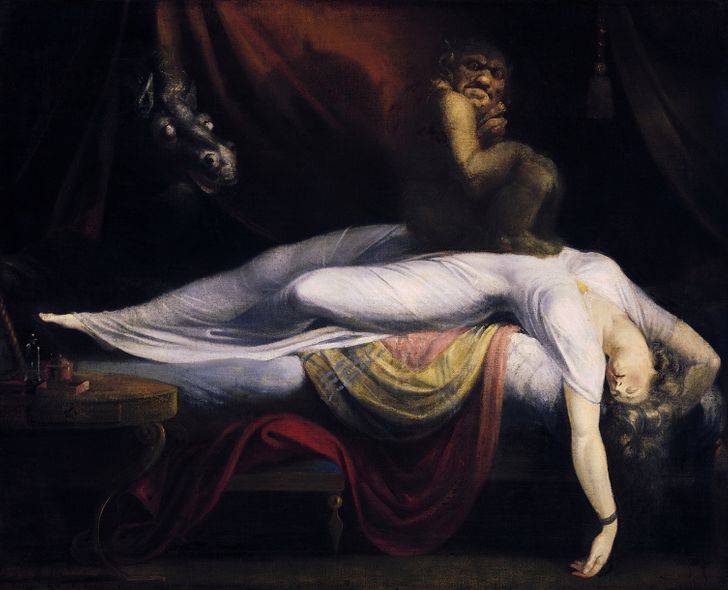it happens to me almost every month that i already get used to it
What Sleep Paralysis Is All About and What Causes It
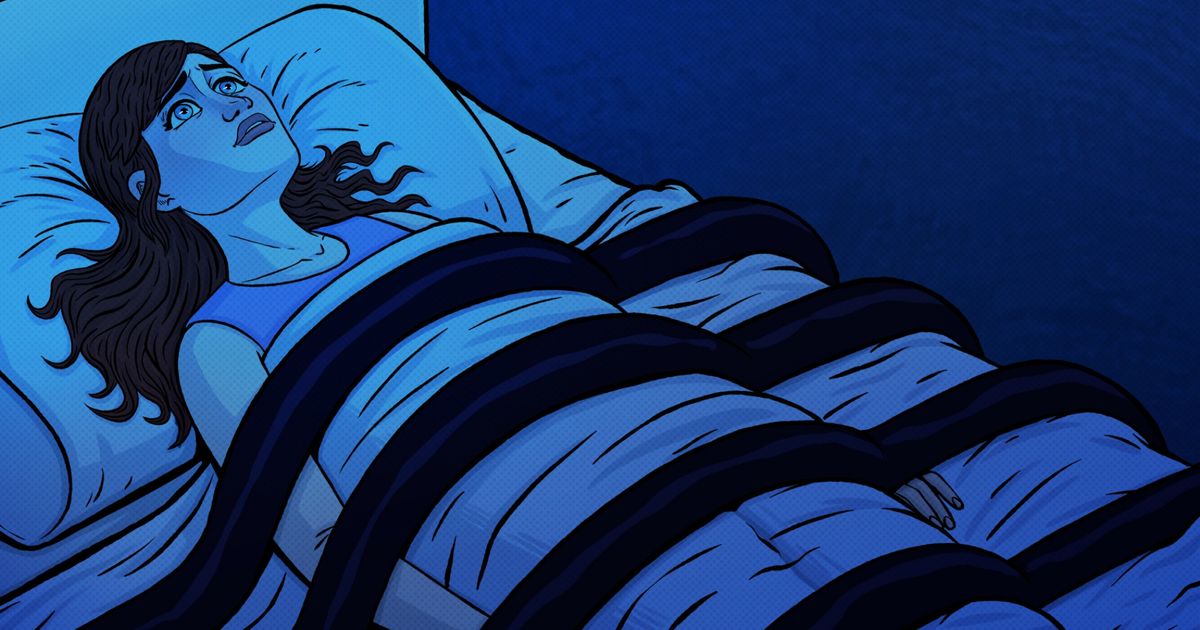
You wake up in the middle of the night. You try to move but your body does not respond. You think it’s a dream, but you’re obviously aware. You try to call for help but you can’t make a sound. So you lie there in your bed, a stranger in your own body.
Congratulations, you’ve met sleep paralysis. Despite being a phenomenon most people have never heard of, up to 7.6% of people suffer this condition at least once in their lives, even if we may not be able to remember it later.
Bright Side addressed some data about this mysterious disorder and wants to share it with you.
What sleep paralysis is
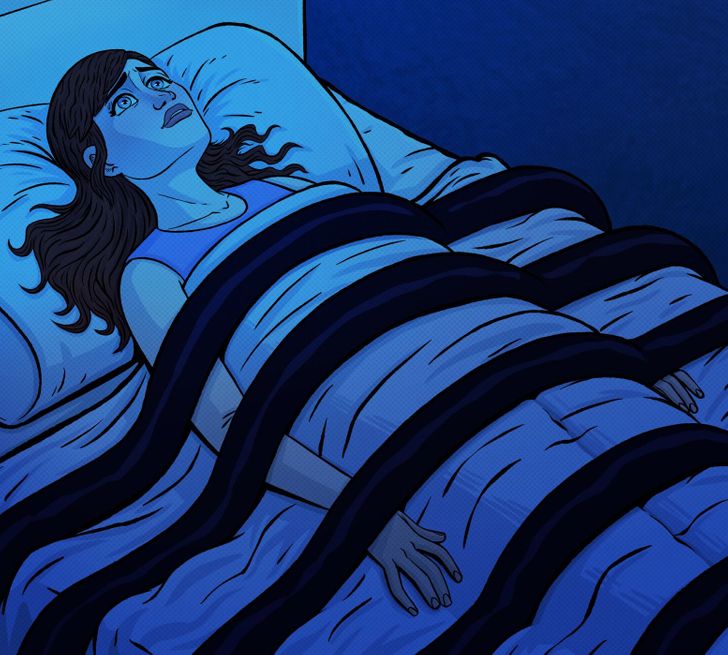
Sleep paralysis is a state in which a person is conscious but unable to move or speak. It usually occurs during one of 2 transitions: when you are falling asleep or waking up. A person experiences the sensation of paralysis and a feeling of heaviness, like someone or something very heavy is sitting on them. It’s commonly accompanied by hallucinations, which makes the situation much more terrifying.
You lose control over your body.
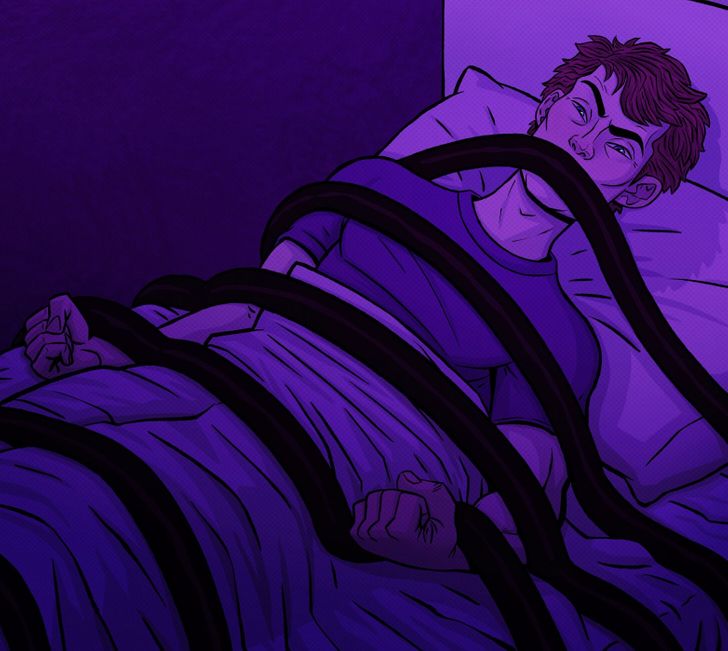
No matter how hard you try, if you experience sleep paralysis, there is nothing you can do to wake up your body. Some people are able to move their fingers or toes, causing them to finally wake up. People often describe it as an “out-of-body experience.” Sleep paralysis can last from a few seconds up to several minutes.
You experience nightmares and hallucinations.
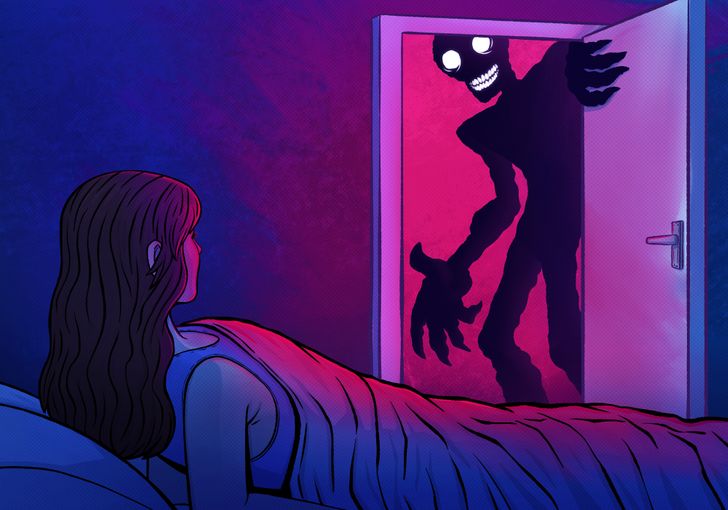
The main symptoms of sleep paralysis include hallucinations and nightmares. However, these are very different from the dreams you see when you sleep. In fact, these “hallucinations” take place when your mind is alert and you feel awake. This makes the situation twice as unsettling.
While paralyzed, people tend to see shadowy figures and hear spooky noises. Sometimes it aligns with the feeling of being dragged out of bed, flying, or vibrations running through the body. Despair also comes into play and we begin to lose control and panic. It’s no wonder that we might suffer from an additional feeling of anxiety when they are unable to scream or move.
It’s older than you think.
People have seemed to notice sleep paralysis from ancient times. There are many stories and legends from around the world that describe something very similar to this condition. People mostly saw it as some kind of demonic possession — or even alien abduction.
An important example related to sleep paralysis is the Renaissance painting by the Swiss artist Henry Fuseli. In it, a demon is shown sitting on the chest of a woman affected by sleep paralysis, symbolizing the strong pressure.
Why it happens
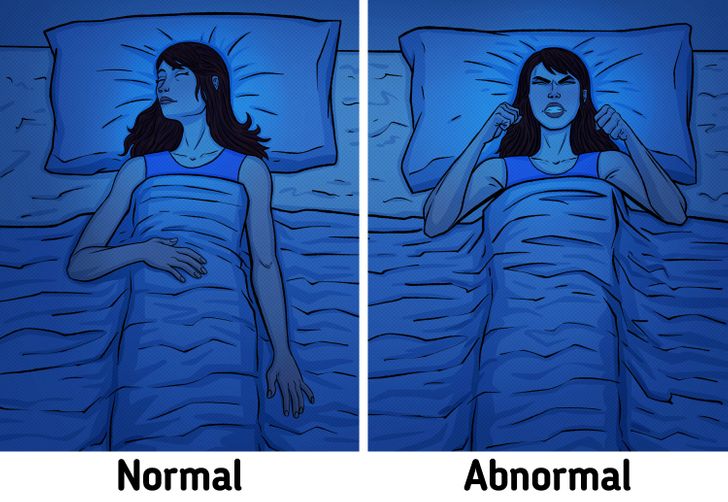
When we sleep, our body enters and exits REM (rapid eye movement) sleep. Our brain sends a command to our muscles to relax, and we enter a state of atonia. This state is necessary to restrict our physical movements so we won’t act out our dreams. Well, sleep paralysis happens when our body has a problem making that transition. We’re awake, but our muscles fail to exit atonia.
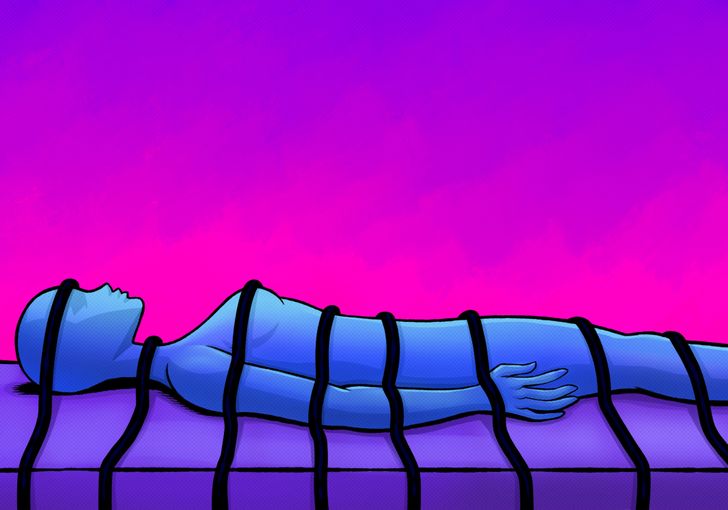
Factors that can lead to sleep paralysis.
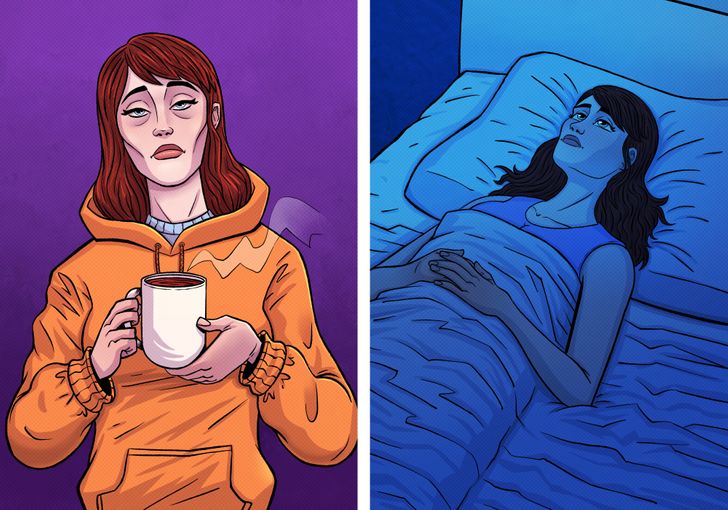
Sleep paralysis is a natural occurrence in its entirety. It can happen to anyone, regardless of age, gender, or health condition. But scientists identified some circumstances that are associated with an increased risk of sleep paralysis. Among them are:
- Poor sleep. This includes infrequent sleep patterns and also various sleep disorders, like insomnia, narcolepsy, and sleep deprivation. It’s also noted that sleep paralysis is common in shift workers.
- Sleeping in a supine position. Surprisingly, sleeping on your back has been found to be a prominent factor in sleep paralysis. It makes the sleeper more vulnerable due to increased pressure on the lungs and airways.
- Genetics. Yep, it runs in the family. Sleep paralysis is inheritable.
- Mental issues. The connection between sleep paralysis and mental health is yet to be explored, but statistics show that people with trauma, PTSD, and various anxieties tend to have sleep paralysis.
How to deal with it
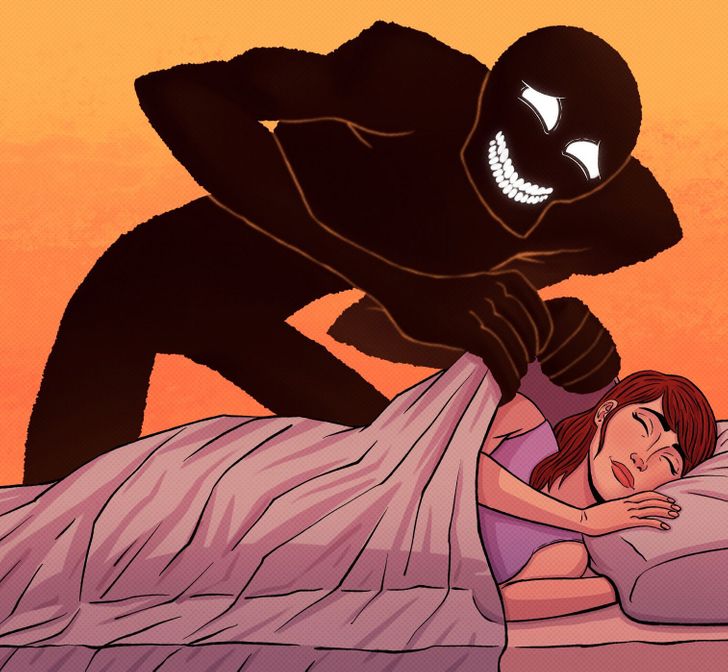
There is no denying that sleep paralysis is an unpleasant and disturbing experience, but it doesn’t carry any real danger since it doesn’t cause any harm to the physical body. And, as unpleasant as it may sound, there is no treatment for now. Generally, doctors recommend adopting healthier sleeping habits. For example:
- Going to sleep and waking up at the same time each day.
- No caffeine or substances before bed.
- Avoid sleeping on your back or stomach.
- Keep electronics out of the bedroom.
But the most important thing is to stay calm and let your episode end on its own. Being calm and not panicking are the key!
What is your way of dealing with poor sleep? If you have ever experienced a sleep disorder, share your story with us!
Comments
I have sleep paralysis. My husband has learned that if I fall asleep on the couch and don’t respond to his voice, that he needs to come grab my hand. I have always been able to hear him but cannot respond. For some reason the movement of my hand wakes me up. I am always on my back on the couch if I fall asleep but generally sleep on my side in my bed. I am a light sleeper and hear the smallish dog’s feet hit the floor. There’s definitely delusions happening during my sleep paralysis, the ones I’ve remembered have been a small ghost couple through the window on the door. (My house now and one house I grew up in. I somehow always fall asleep on a couch facing a door. Definitely subconscious.)
I agree with the article, I really think I have it less frequently now that I get enough REM and deep sleep each night. I used to have restless sleep, eventually if it was basically 7-8 hours:
I've had this once in my life before while i woke up in the middle of the night and it was a really scary experience, didn't last too long tho... I think it was a few minutes but felt like seconds... I just slept again.
This has happened to me two days in a row. I was working late on an assignment, went to bed on my back at 1am, woke up an hour later hear a loud noise, like a waterfall or blood rushing in my ears, so I opened my eyes and realized I couldn’t move. And after a few seconds, a vibration ran through my whole body from my toes to my head. And it scared me worse because my head was under the blanket, so I was feeling claustrophobic. After a while (i don’t even know how long), I had to consciously move my arm and it was over.
Today, I took an early nap around noon and it happened again the same way. Woke up hearing the waterfall/static noise, couldnt move, full-body vibration (less intense), went on for a while and it just stopped. I panicked each time, and I don’t seem to be able to fall asleep or ignore it. I’m not even sure if I blink or just stare. Every time it’s over I can barely process what happened.
Luckily I don’t seem to have visual hallucinations but the not being able to move is scary enough. Both times I was on my back. I’ll try to get better sleep but hopefully sleeping on my side will stop it
Related Reads
15 Quiet Moments of Kindness That Made the Biggest Impact
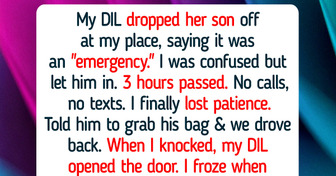
A Stranger Humiliated My Daughter at Disney World—He Picked the Wrong Mom to Mess With

10 Stories That Prove Kindness Has Healing Power When the World Seems Unfair
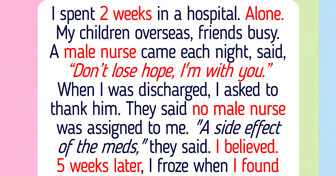
I Refuse to Let My Brother’s Girlfriend Control My House—I Put a Stop to It Fast

15 Stories That Prove Repairmen Are Full of Surprises
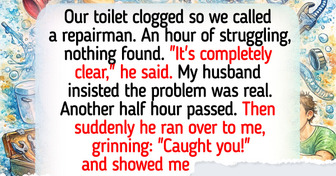
My Brother Has No Kids but Refuses to Share His Inheritance With Mine—I’m Furious
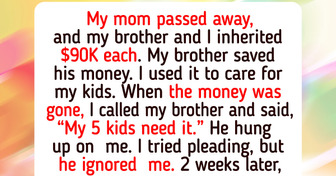
10 Hospital Workers Who Prove Kind Heart Is a Powerful Medicine

15 Moments That Prove Kindness Is the Thread Holding Life Together
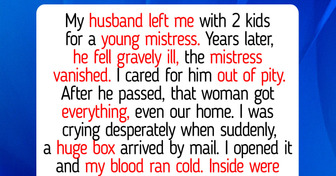
I Refused to Give My Brother My $40K Wedding Fund—My Family’s Revenge Was Brutal
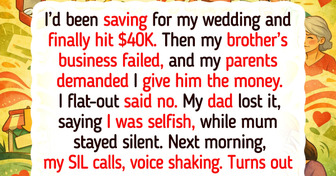
I Refuse to Return to the Office After My Coworker’s ‘Prank’ Revealed His Darkest Secret
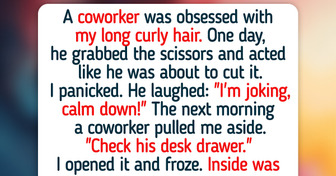
11 People Who Chose Humanity Over Hatred in the Darkest Moments
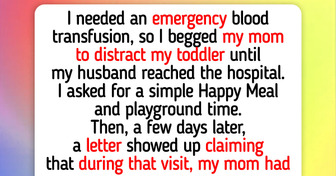
18 People Who Found Out That Small Acts of Kindness Are the Pathway to Happiness
